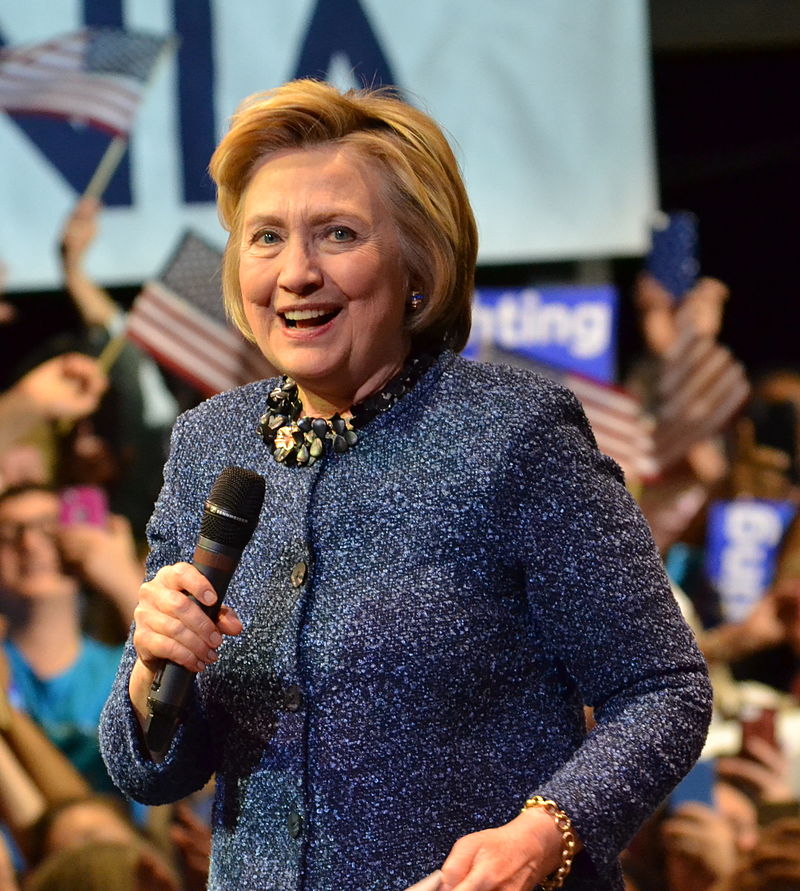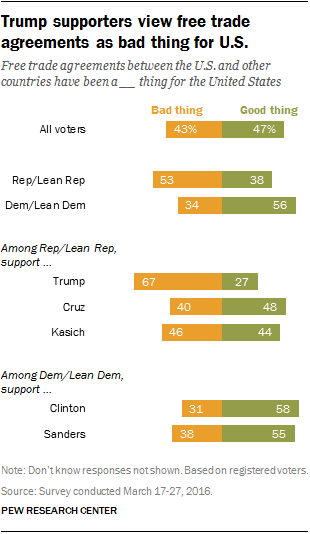Who Can Free Traders Vote for in 2016? Trump, Hillary Are Dead-Set Against It.
Only Libertarian Gary Johnson supports free trade and opposes tariffs, "period."

If the Brexit vote tells us next to nothing about domestic U.S. politics, it did reveal a strange contradiction among many left-leaning American commentators. Liberals and progressives overwhelmingly voiced solidarity with the Remain camp, often invoking as a great thing the European Union's impressive (if far from perfect) creation of a free-trade zone in which goods and services flowed freely among member states.
Ironically, many of the same people who bemoaned the Leave side winning in the United Kingdom are highly critical free-trade agreements that the United States is either already part of or trying to join. So, for instance, before the Brexit vote, an advisor for Hillary Clinton told British media that she was firmly on the Remain side of the battle: "She has always valued a strong United Kingdom in a strong EU. And she values a strong British voice in the EU." After the vote, her campaign ran an ad attacking Donald Trump for his strong support for the Leave position.
And yet, when it comes to liberalizing trade with foreign countries, both Trump and Clinton hold essentially the same position of being adamantly opposed. Trump has denounced the North American Free Trade Agreement (NAFTA), signed into law by Clinton's husband in 1993, and has said his first order of business if elected will be to renegotiate its terms or pull out of it. As it happens, Clinton has been attacking NAFTA as a mistake since at least 2007, when she first started running for president. Her campaign website for the 2008 race proclaimed, "NAFTA was negotiated more than 14 years ago, and Hillary believes it has not lived up to its promises." And at a 2007 presidential debate, she said, "NAFTA was a mistake to the extent that it did not deliver on what we had hoped it would." Indeed, she even called "for a trade timeout."

Let's leave aside for the moment that both Trump's and Clinton's negative evaluation of NAFTA is entirely wrong. The U.S. economy and job market flourished in the wake of its implementation in 1994 and most economists say that it has had smaller but positive effects than either its champions or detractors feared.
Clinton and Trump also see eye-to-eye on the Trans-Pacific Partnership (TPP), the other big trade deal that's front and center in the 2016 election. Trump, who in an early GOP debate didn't seem to realize that China was the target of the pact and not a participant in it, describes TPP as "a continuing rape of our country." Clinton's rhetoric is milder, but her position is just as plain. Despite supporting the Obama administration's continuing efforts to broker the 12-nation deal while secretary of state, she is now absolutely against it. "I am not in favor of what I have learned about it," she told CNN last fall:
I have said from the very beginning that we had to have a trade agreement that would create good American jobs, raise wages and advance our national security and I still believe that is the high bar we have to meet… I don't believe it's going to meet the high bar I have set.
Fact-checker sites agree that Clinton has flip-flopped on this issue, almost certainly in reaction to Bernie Sanders' unrestrained and popular denunciations of anything related to free-er trade during the Democratic primaries. But there's no reason to believe she will be changing her tune anytime soon.
So both of the presumptive nominees for the two major parties are anti-free-trade deals. As important, neither of them has a kind word to say about free trade in principle. Each of them sees trade as a means by which powerful nations exert pressure on less-powerful nations to do things a certain way, whether it's pricing items so they're not competitive with American products or enacting all sorts of environmental and labor regulations that will drive up costs (that "high bar" of which Clinton speaks).
Interestingly, Donald Trump's position is actually in line with how the typical Republican feels about free trade agreements. In research released earlier this spring, Pew found that 53 percent of voters who identify as Republican or who lean Republican agree that free trade deals "have been a bad thing for the United States." Only 38 percent disagreed. When it comes to Democrats and those who lean Democrat, only 34 percent think trade deals have been a bad thing, while fully 56 percent think they have been a good thing.
Thus Trump—who has often been accused of "stealing" the Republican Party from its rightful establishment—is in lockstep with actual GOP voters. And Hillary Clinton, who bemoans the end of the United Kingdom's membership in the planet's largest free-trade zone, is at loggerheads with what the large majority of rank-and-file Democrats believe. That Democrats, long considered the party of unions and economic protectionism, actually favor free trade more than Republicans is yet one more sign that the two major parties no longer represent viable coalitions of ideologies and interest groups. The current iterations of each party traces back to the mid-1960s, when Southern Democrats started to swith allegiances and Republicans embraced Goldwaterism. What broad agreements each party reached with its constituents seem to have frayed to a point where party leadership seems to be radically out of touch with what members actually believe. That, along with general disbelief in the competency of either party to govern, explains the huge and continuing fall in voter identification with either the Dems or the Reps.
If you are looking for a presidential candidate who believes that free trade and free trade agreements are generally good things, there's only the Libertarian nominee Gary Johnson, who has consistently criticized Trump's calls for trade wars with China and other countries and says Clinton's "answer for everything is more government."
"Free trade," he told MSNBC earlier this week,
doesn't mean forcing Apple to make their iPads and iPhones in the United States, that doesn't mean a 35% tariff on imported goods….Let's rule the world with free trade. Let's bring peace to the world. Let's involve ourselves diplomatically.
Elsewhere, his position is quoted as being:
Johnson supports free trade and opposes tariffs, "period."
So there's that.


Show Comments (86)